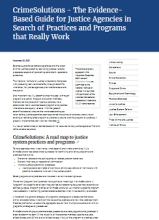Criminal justice system effectiveness
Forensic Science and the Administration of Justice: Critical Issues and Directions
CrimeSolutions - The Evidence-based Guide for Justice Agencies in Search of Practices and Programs that Really Work
National Institute of Justice 2018 Annual Report
Probation and Parole: Public Risk and the Future of Incarceration Alternatives
Psychological Effects of Solitary Confinement
Does Judicial Monitoring Deter Domestic Violence Recidivism?: Results of a Quasi-Experimental Comparison in the Bronx
Evaluation of Victim Advocacy Within a Team Approach (From Violence Against Women and Family Violence: Developments in Research, Practice, and Policy, 2004, Bonnie Fisher, ed. -- See NCJ-199701)
Prosecution of Domestic Violence Offenses, Final Report
Realities and Implications of the Charlotte Spousal Abuse Experiment (From Do Arrests and Restraining Orders Work? P 54-82, 1996, Eve S and Carl G Buzawa, eds. -- See NCJ-161517)
Comparison of Two Prosecution Policies in Cases of Intimate Partner Violence: Mandatory Case Filing Versus Following the Victim's Lead
Ultimate Impacts of Sentencing Reforms and Speedy Trial Laws: A User's Guide to the Machine-Readable Files and Documentation and Codebook
Testing Deterrence and Incapacitation as Crime Control Mechanisms: A Refinement of the Hypothesis
Improving the Community Response to Sexual Assault: An Empirical Examination of the Effectiveness of Sexual Assault Response Teams (SARTs)
Female Victims of Partner Versus Nonpartner Violence: Experiences with the Criminal Justice System
Lessons Learned From 30 Years of Prison Programs
Fostering Innovation Across the U.S. Criminal System: Identifying Opportunities to Improve Effectiveness, Efficiency, and Fairness
Real-Time Crime Forecasting Challenge Webinar
This webinar will offer a brief overview of the National Institute of Justice and the data science needs of the criminal justice field. In addition, it will provide details about the Crime Forecasting Challenge, including who can submit, how to retrieve datasets, and the submission categories. The overall goal of the Crime Forecasting Challenge is to harness recent advances in data science to drive innovation in algorithms that advance place-based crime forecasting.
See the YouTube Terms of Service and Google Privacy Policy
NIJ Journal Issue No. 271
Discussing the Future of Justice-Involved Young Adults
New science in brain development is transforming young adult involvement with the justice system. On Tuesday, September 8, Attorney General Loretta Lynch, Assistant Attorney General Karol Mason, and experts from NIJ and the Harvard Kennedy School Program in Criminal Justice who serve on the Executive Session on Community Corrections discussed the future of justice-involved young adults.
See the YouTube Terms of Service and Google Privacy Policy


